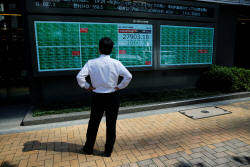Shares shrivel as traders see higher rates under Powell; Turkish lira
sinks
 Send a link to a friend
Send a link to a friend
 [November 23, 2021] By
Tommy Wilkes [November 23, 2021] By
Tommy Wilkes
LONDON (Reuters) - Stock markets fell and
the dollar held near a 16-month high on Tuesday as investors positioned
for interest rate hikes in 2022 after Federal Reserve Chairman Jerome
Powell was nominated for a second term.
The most dramatic moves were again in the Turkish lira, which lost 11%
of its value, crashing to a record low of 12.8 lira per dollar as
investors panicked after President Tayyip Erdogan defended recent rate
cuts and showed little concern for rising inflation.
Volatility in the Turkish currency surged to eight-month highs.
Graphic: Lira volatility:
https://fingfx.thomsonreuters.com/
gfx/mkt/xmvjorwmrpr/Lira%20volatility.png
In developed markets stocks were weaker across the board. Futures on
Wall Street pointed to a second day of losses in the United States.
The EURO STOXX 50 dropped 0.67%, off the lows of the day, while
Britain's FTSE 100 shed 0.1% and Germany's DAX 0.72%%.

MSCI's gauge of Asia Pacific stocks outside Japan fell 0.43%, while Hong
Kong's Hang Seng Index slid 1%.
U.S. President Joe Biden on Monday tapped Powell to continue as Fed
chair, and Lael Brainard, the other top candidate for the job, as vice
chair. The news initially buoyed Wall Street stocks, before the market
pulled back into the afternoon with the S&P 500 and Nasdaq Composite
closing down from all-time highs.
The sense that a second term under Powell could add to policymakers'
desire to curb rising inflationary forces also sent investors buying
dollars.
The greenback, measured against a basket of currencies, rose to a new
16-month high and pushed the euro further below $1.13 to $1.1226, the
weakest level for the single currency since July 2020. At 1215 GMT the
euro was off those lows.
"On the one hand, U.S. President Joe Bidenís decision to confirm Jerome
Powell as Fed chair is generally seen as more positive for the greenback
as Mr. Powell is considered less dovish than Lael Brainard," said
UniCredit strategists.
"On the other hand, the fact that current COVID-19 developments are
primarily affecting the eurozone represent another drag on the common
currency."
U.S. Treasury yields were led higher by two-year notes, which typically
move in step with interest rate expectations. Those yields hit their
highest level since early March 2020 at 0.687% before dipping back.
[to top of second column] |

A man watches an electric board showing Nikkei index outside a
brokerage at a business district in Tokyo, Japan, June 21, 2021.
REUTERS/Kim Kyung-Hoon

Steen Jakobsen, Chief Investment Officer at Saxo Bank, said "the selloff in
Treasuries amplified when Fed Atlanta President Bostic called for fast tapering
that would give the option to hike interest rates earlier if needed, confirming
a hawkish tilt within FOMC (Federal Open Market Committee) members.
"Interest rate hike expectations advanced with the market now pricing almost
three hikes into 2022," he added.
Market expectations for a first European Central Bank rate rise were brought
forward to December 2022.
COVID CONCERNS
Adding to the gloomy mood were new concerns about the spread of COVID-19.
Riskier assets have been shaken in recent sessions by surging COVID-19 cases in
Europe and renewed curbs, dousing investor hopes of a quicker recovery in
consumption and growth worldwide.
Germany's outgoing Chancellor Angela Merkel said the latest surge is the worst
experienced by the country so far, while Austria went into a new lockdown on
Monday.
Euro zone purchasing managers index numbers for November showed business growth
unexpectedly accelerating but that failed to lift sentiment.
In commodities, spot gold slid 0.45% to $1,796 an ounce. Gold prices were under
pressure as Powell's nomination drove expectations that the central bank will
stay the course on tapering economic support.
Oil prices were in the red again after a short rebound the previous day from
recent losses on reports that OPEC+ could adjust plans to raise oil production
if large consuming countries release crude from their reserves or if the
coronavirus pandemic dampens demand.
Brent crude weakened 0.95% at $78.94 a barrel and U.S. crude dropped 1.38% to
$75.69 per barrel.

The U.S. Department of Energy is expected to announce a loan of oil from the
Strategic Petroleum Reserve on Tuesday in coordination with other countries,
Reuters reported earlier.
(Editing by Raissa Kasolowsky and Angus MacSwan)
[© 2021 Thomson Reuters. All rights
reserved.] Copyright 2021 Reuters. All rights reserved. This material may not be published,
broadcast, rewritten or redistributed.
Thompson Reuters is solely responsible for this content. |